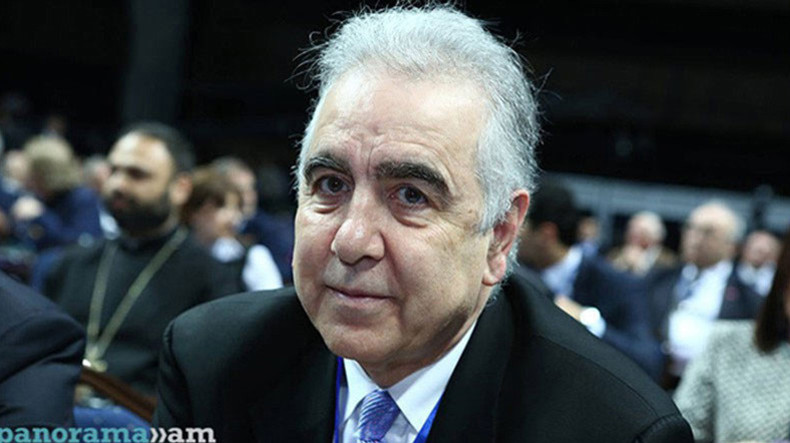
America has no right to tell Armenia not to send a humanitarian squad to Syria
By Harut Sassounian
Publisher, The California Courier
The US government recently created a new and unnecessary controversy, this time with the Republic of Armenia.
It all started when the Armenian government decided to send a non-combat humanitarian squad of 83 doctors, sappers, and other servicemen to Syria to provide assistance to the important, but dwindling Armenian community in Aleppo. Armenia had previously sent four airlifts of humanitarian assistance to the Syrian people.
A Russian cargo plane flew the Armenian squad to Aleppo on February 8. Apparently, this small role played by Russia was enough to provoke the ire of the cold-warriors in Washington. On February 13, the US Embassy in Armenia released an announcement by the State Department criticizing the dispatch of the Armenian humanitarian squad to Syria.
“We do not support any engagement with Syrian military forces, whether that engagement is to provide assistance to civilians or is military in nature. Nor do we support any cooperation between Armenia and Russia for this mission,” stated the State Department.
This statement antagonized not only the Armenian government, but also the population of Armenia which the United States has been trying to win over in recent years. More importantly, this provocative US statement irritated the large Armenian-American community.
The Armenian squad’s involvement in Syria was based on several factors:
1) Syria’s Arabs had played a critical role by providing a life-saving refuge to the remnants of the Armenian Genocide, including this writer’s grandparents. It is only fitting that the Armenian government and all Armenians reciprocate to Syria’s goodwill by coming to the rescue of the destitute local Armenians and Syrians in general.
2) The Armenian government has sent the humanitarian squad based on an inter-state agreement signed by Armenia and Syria in 2001. Therefore, this action is not only of a humanitarian nature, but also complies with requirements of international law.
3) The United States, on the other hand, has dispatched its Air Force and soldiers to Syria without the approval of the Syrian government, thus violating all relevant international laws. This illegal action is not committed by Armenia, but by the United States.
4) The Trump Administration and particularly hawkish National Security Advisor John Bolton have been striving to distance Armenia from Russia and draw it closer to the American sphere of influence. Regrettably, criticizing the Armenian government’s humanitarian aid to its compatriots in Syria does not endear the United States to Armenians. Just the opposite, it antagonizes Armenians worldwide. The US position simply reflects a poor knowledge of the realities in the Middle East by Trump officials. It makes no sense to try to compel Armenia to desist from sending a humanitarian squad to Syria, knowing full well that such pressure will be rejected, making the American government look weak and ineffective. US officials should have the wisdom to know when to exert their influence and when not to. In this particular case, pressuring Armenia was counter-productive; it only served to strengthen the influence of Russia. Fortunately, such a minor issue will not undermine the friendly relationship between the United States and Armenia. Armenians understand that the US displeasure is more directed towards Russia and Iran than to Armenia itself. The US government is well aware that Armenian troops have participated in international peacekeeping missions, such as Afghanistan, Iraq, Kosovo and Lebanon.
5) The United States government has lost its moral authority to lecture Armenians on any subject given the fact that successive US Presidents in recent decades have refused to utter the term Armenian Genocide under pressure from the despotic Turkish regime.
The Armenian Foreign Ministry spokeswoman Anna Naghdalyan reacted to the State Department’s statement by declaring that “throughout the Syrian conflict the plight of civilians, minorities, including the sizable Syrian-Armenian community has consistently been a priority concern for the Armenian people worldwide. The Armenian public opinion strongly reflects deep compassion and concern for the sufferings of civilians and the devastation of the country. We speak about a country which has had an indispensable contribution for the survival of the Armenian nation in the wake of the Armenian Genocide.”
Naghdalyan also stated that the deployment of the humanitarian mission to Syria is intended to support the Armenian community in Aleppo. “It is a purely relief mission guided by International Humanitarian Law and [Armenia] coordinates its work with the relief agencies and international partners present on the ground.”
Going a step further, on February 12, Armenia’s Defense Minister Davit Tonoyan announced that the humanitarian mission did not exclude the possibility of deploying combat troops in Syria in the future. However, the Armenian Prime Minister Nikol Pashinyan quickly rejected that possibility, stating that “we have no such plans.”
Americans, Russians, and everyone else should understand that the Armenian government will pursue its national interests regardless of the wishes of other nations. No amount of pressure will deter Armenians from their own objectives.
Related news
- Armenia ‘takes note’ of U.S. reaction to Syria humanitarian mission – Foreign Ministry
- Defense minister: Armenia’s humanitarian mission in Syria ‘in line with the letter of the law’
- Defense minister, UN Resident Coordinator discuss the Armenian humanitarian mission in Syria
- Expert says international community to assess Armenia’s humanitarian mission in Syria over the time
- Armenia dispatches humanitarian mission to Syria’s Aleppo
Newsfeed
Videos






























